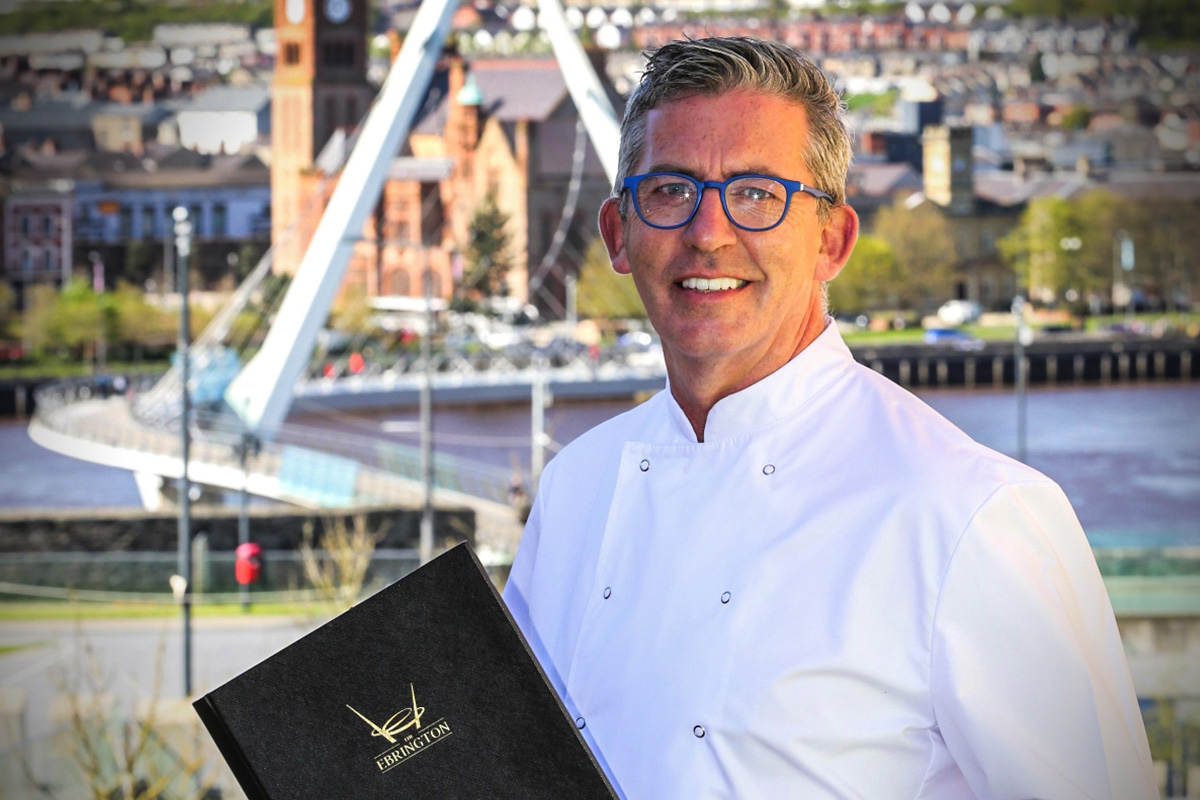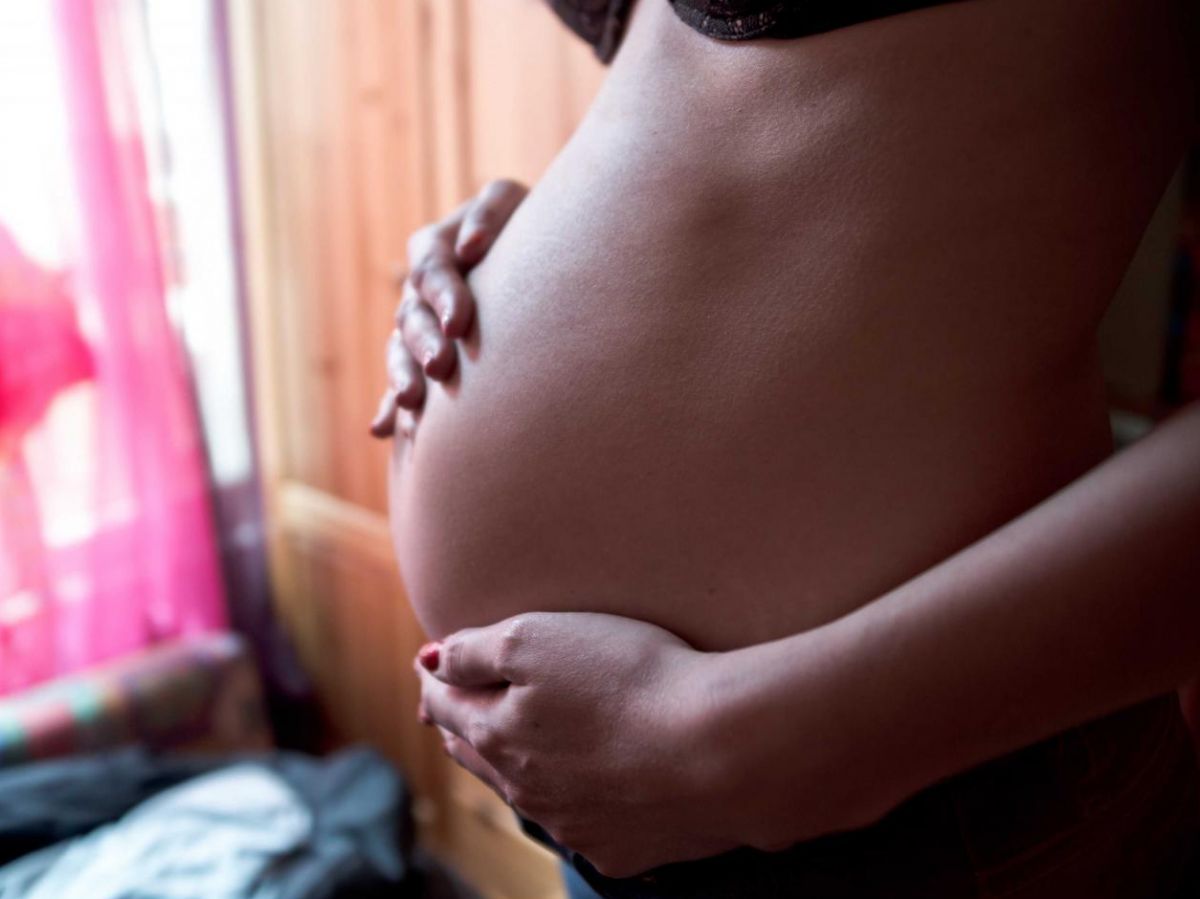
Chef Noel McMeel, culinary director of the new Ebrington Hotel in Derry, Ireland, is known as the “King of Modern Irish Cuisine” because he pioneered the use of fresh, local and seasonal Irish ingredients. He is also the author of the world’s third best cookbook, Irish Pantry, and a popular Irish television broadcaster.
Chef Noel grew up on the family farm, inspired by his mother’s traditional home cooking; but long before he became a chef, he was the All-Ireland champion of traditional Irish dancing from the ages of 14 to 17. He could have continued dancing, but cooking was his passion. McMeel received a scholarship to the prestigious Johnson & Wales University and went on to work in some of America’s most famous restaurants, including Le Cirque, Chez Panisse and Jean-Louis Palladin at the Watergate, where he met the Clintons. McMeel – that’s his real name – was once told by a US agent to go to McDonald’s and sell his name as “Big McMeal”. McMeel laughed it off.
For this interview, I flew to Ireland and visited his home in the beautiful North Island countryside. Here, Chef Noel McMeel lives with his partner, Dessie; dog, Bailey; cat, Tittles and twenty-one chickens.
Exclusive Interview with Chef Noel McMeel
What got you into cooking?
I always wanted to be a good cook. I loved food. For us, food was really a thank you, prepared by the hands of my mother and family: the jam, the bread, the cakes. The ham came from the pigs, the milk from the cows; the trifle was the skimmed cream of the milk that we kept to whip. Getting ready for a meal at my house was like getting ready for royalty, because you used the best plates and glasses. There were roses that you picked yourself and the scent that went through the house was incredible. The celebration of food was so important to us.
What were the core values of your home?
Giving was massive. My parents gave each child in our home a toolbox of love, sharing, respect, and decency. As we got older, they piled up more and more tools. I still use those tools every day.
You are now the Culinary Director at the Ebrington Hotel in Derry, North Island. What is a Culinary Director?
A culinary director is a visionary of where we are today and where we could be. It’s about setting the right direction for that establishment. How do you create a foundation to build on? My job is to build something that represents great heritage but provides great comfort for guests and, most importantly, a great experience.
You worked at the Lough Erne Resort in Ireland for 17 years before taking up your current role at the Ebrington Hotel in Northern Ireland. Were you also serving high-end cuisine at Lough Erne?
There were seven different dining spaces within this complex, including a fine dining restaurant. The execution had to be top-notch, especially by global standards. It doesn’t take just two or three years to build a team. Some people who come in just never buy into the concept; to them it’s just a job. My job was to create great people who believed in my vision and wanted to do something different than any other hotel.
What was your vision?
My vision was, firstly, that when people came, they would have a Northern Ireland experience like no other, with traditional breads served with local butter, beautifully displayed. Welcoming guests to the hotel was the most important thing. It’s all about hospitality. When you go out to eat, it’s always about company. Company is number one. Some people would say that food is the first thing, but it’s not. Once you have good food and good company, your day will be vastly improved.
The gifts were the produce of the garden, whether it was rhubarb crumble or rhubarb tarts or blackberry or blueberry jam. The gifts were always returned because they were fueled by the heart. I think everything I was taught as a child – love, care and respect – is what you should do with people. Respect and kindness to people is very much reflected in cooking, because your cooking depends on what you put on a plate. You don’t need to meet the chef, because he shows who he is by everything he puts on the plate: whether the ingredients are fresh or not and the design of the plate itself. You can almost tell what kind of cooking it is: the meat is beautifully sliced and meticulously cooked.
How do you describe your cooking?
Modern Irish cuisine. I worked in France and studied what modern French was; I worked with great British chefs, I worked in America, but what is cuisine? I live here. I buy local butter. I buy flour from Belfast. The salt is Irish Sea salt, the sugar is from Dublin. The beef is local. I bring all these ingredients into my kitchen. What I do is modern Irish cuisine with the great skills that I have acquired over the years from all the amazing chefs that I have worked with.
What does it mean to be a great leader?
First you need a clean kitchen, just as an Irish dancer needs a clean floor to dance on. You need to fill empty refrigerators with fresh food. Fresh produce always shines above old stuff.
Why did you leave Lough Erne and come to Ebrington?
During COVID I got a taste of what it was like to go away for the first time in my life and spend time with my partner, time with nature, time with the garden. I had spent my whole life working. I had planned to semi-retire at 55 and when I turned 55 it was time. I had employed some great people and I finally moved them up the ladder so that there wouldn’t be a big difference when I left. And the establishment moved on to bigger and better things that I’m so proud of. I’m a big believer in giving as much as you can to everyone. Don’t be a taker. It’s a gift to give. And it’s good for your soul to be able to give as much as you can because you will eventually move on to bigger and better things yourself. The secret is to give, but not expect anything in return.
What is the best meal you have ever eaten?
I’ve had many great experiences of incredible meals, but my best was a meal that influenced me because of the people around me; it was with Alice Waters, because it made me understand what simplicity in food was. Before I left, Alice treated me to dinner. She’s an iconic person not because she’s famous, but because she’s such a humanitarian, a person with a great vision, a greatness that’s tied to the quality of the food, but more importantly, the journey of what you have to do to achieve something of greatness. She was willing to share that, and I just soaked it up like a sponge. I remember writing in my journal, “It took me 10 years to discover what simplicity really means. Taking the best of local ingredients, cooking it as little as possible, and serving it with great skill.”
What was the difference between the other chefs you worked for in America and Alice Waters?
In the very beginning, when I was trying to learn, I wanted to cook fancy dishes, to see how much more I could put on the plate. When I worked with Jean-Louis Palladin, it was very fancy and he was a very hard-working chef. Then he got me my job at Le Cirque in New York. It was pretty incredible. One day we were having lunch and one of the waiters said, “Come on over!” He pulled the curtain back slightly and said, “Do you see who’s at this table?” I was a very naive Irishman and I asked, “Who?” He told me that three former American presidents were having lunch. I knew I was cooking for some great people.
Then when I went to San Francisco. Julia Child had encouraged me to go talk to Alice Waters and try to get a job. I had tried before and I had been turned down. It was through the power of Julia Child that I got in. I went from the Circus, with all the chandeliers and the gold, to a place with a picket fence where everything was made of wood. I loved everything about it. And I was privileged because I had the skills rather than not having any skills and wanting to be there. I could work well and perform well.
What advice would you give to future chefs?
To be the best, you have to work with the best because they will influence you to be the best you can be.
You were a dancing champion and you said that dancing is like cooking. How?
Irish dancing taught me precision. When the curtains open, it’s no different than food: it’s about performance, execution. You’ve done your homework and your preparation. Your uniform is impeccable. In dance, every tap is so important. It’s precision, just like food. Every element has to be really hot and everything has to work together. The same is true with dance. It’s all about the rhythm, how you move every second.
What do you want your legacy to be?
That I was a good person, that I spent my time on this earth well, and that I was a giver.
Article by Margie Goldsmith, who filled her heart with Ireland. Thanks to www.Ireland.com •



